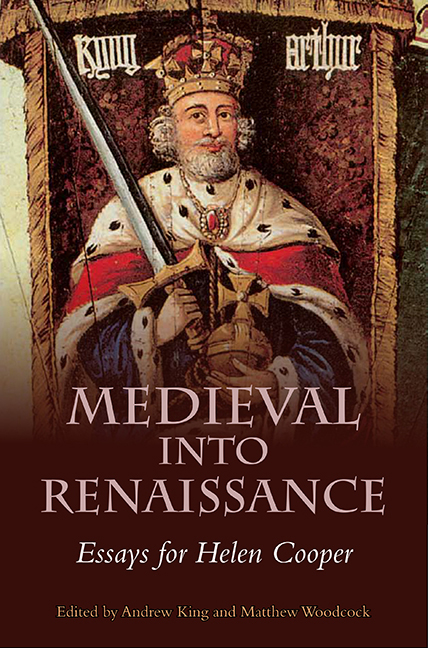Book contents
- Frontmatter
- Contents
- List of Illustrations
- List of Contributors
- Acknowledgments
- Abbreviations
- Introduction
- Unknowe, unkow, Vncovthe, uncouth: From Chaucer and Gower to Spenser and Milton
- Armour that doesn't work: An Anti-meme in Medieval and Renaissance Romance
- ‘Of his ffader spak he no thing’: Family Resemblance and Anxiety of Influence in Fifteenth-Century Prose Romance
- Writing Westwards: Medieval English Romances and their Early Modern Irish Audiences
- Penitential Romance after the Reformation
- The English Laureate in Time: John Skelton's Garland of Laurel
- Thomas Churchyard and the Medieval Complaint Tradition
- Placing Arcadia
- Fathers, Sons and Surrogates: Fatherly Advice in Hamlet
- ‘To visit the sick court’: Misogyny as Disease in Swetnam the Woman-Hater
- The Monument of Uncertainty: Sovereign and Literary Authority in Samuel Sheppard's The Faerie King
- Mopsa's Arcadia: Choice Flowers Gathered out of Sir Philip Sidney's Rare Garden into Eighteenth-Century Chapbooks
- Bibliography
- Index
- A Bibliography of Helen Cooper's Published Works
- Tabula Gratulatoria
The Monument of Uncertainty: Sovereign and Literary Authority in Samuel Sheppard's The Faerie King
Published online by Cambridge University Press: 05 July 2016
- Frontmatter
- Contents
- List of Illustrations
- List of Contributors
- Acknowledgments
- Abbreviations
- Introduction
- Unknowe, unkow, Vncovthe, uncouth: From Chaucer and Gower to Spenser and Milton
- Armour that doesn't work: An Anti-meme in Medieval and Renaissance Romance
- ‘Of his ffader spak he no thing’: Family Resemblance and Anxiety of Influence in Fifteenth-Century Prose Romance
- Writing Westwards: Medieval English Romances and their Early Modern Irish Audiences
- Penitential Romance after the Reformation
- The English Laureate in Time: John Skelton's Garland of Laurel
- Thomas Churchyard and the Medieval Complaint Tradition
- Placing Arcadia
- Fathers, Sons and Surrogates: Fatherly Advice in Hamlet
- ‘To visit the sick court’: Misogyny as Disease in Swetnam the Woman-Hater
- The Monument of Uncertainty: Sovereign and Literary Authority in Samuel Sheppard's The Faerie King
- Mopsa's Arcadia: Choice Flowers Gathered out of Sir Philip Sidney's Rare Garden into Eighteenth-Century Chapbooks
- Bibliography
- Index
- A Bibliography of Helen Cooper's Published Works
- Tabula Gratulatoria
Summary
Samuel Sheppard wrote his extended poem The Faerie King as a tragic-epic response to the events of the English Civil War – in particular the execution of Charles I – over a period of at least five years (c.1648–54). This was a time during which, in Sheppard's words, ‘violent hands have made/ England a Den of Dragons’. Much of the work was composed in prison, in particular Newgate Gaol – certainly a den, for Sheppard, of disease and despair, if not quite dragons. Sheppard writes: ‘I languished (surrounded with Dolour, Indigencie, Obloquie with all their Appurtenances) almost fourteene months where my best musick was the ratling of cheines the gingling of Irons, and the groanes of men destind for destruction.’ Elsewhere in the poem Sheppard describes his prison writing context as a place both of literal hunger and of appetite for literary fame:
I who scarce Injoy the common ayre who drinke the dreggs of Want and Penurie, feeding on FFeare, and followd by Despaire exhibit songs unto Posteritie so Ovid neere to Isther wrapt in woe made better musick then the Swans of Poe. (FK, V.ii.4)
Literature written in exile or incarceration – such as works by Ovid, Boethius, Malory, or indeed Wilde – often combines nuanced judgement and evaluation with emotional turbulence and anxiety, and The Faerie King is no exception. Arguably the most striking element in this work, which certainly deserves more attention than it has received, is the poem's richly ambivalent portrait of Charles I, depicted in the figure of Ariodant, first prince and then briefly the contested king of Ruina. It was Sheppard's unmitigated support for Charles and the institution of monarchy in the late 1640s, expressed through underground royalist newsbooks, that landed the writer in prison on more than one occasion. In Mercurius Dogmaticus, for instance, Sheppard inveighs against Parliament for sanctioning the imprisonment of the king: ‘Where is our Great and Glorious King, whose Throne they once boasted to elevate above all his Ancestors?
- Type
- Chapter
- Information
- Medieval into RenaissanceEssays for Helen Cooper, pp. 209 - 234Publisher: Boydell & BrewerPrint publication year: 2016

